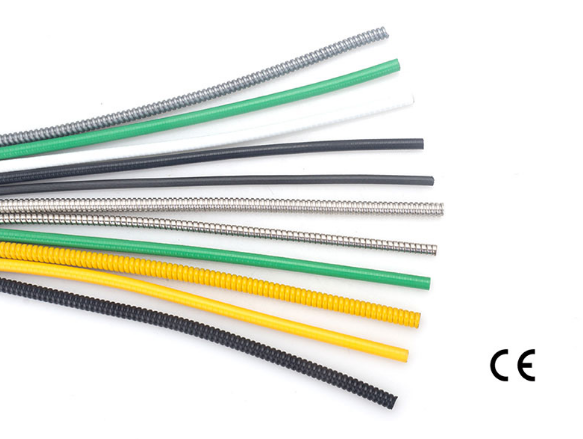Jul. 03, 2023
Electrical flexible conduit, also known as flexible electrical conduit or flexible conduit pipe, is a protective tubing used in electrical installations to protect and route electrical wires and cables. It is designed to provide flexibility, durability, and mechanical protection to the electrical wiring system. In this response, we will explore the working principles of electrical flexible conduit and its applications in more than 600 words.
Working Principles of Electrical Flexible Conduit:
Electrical flexible conduit consists of a flexible, tubular structure made of various materials such as metal, plastic, or a combination of both. The conduit is typically corrugated or interlocked, allowing it to bend and flex without damaging the enclosed wires or cables. The working principles of electrical flexible conduit are as follows:
1. Wire Protection:
The primary purpose of electrical flexible conduit is to protect electrical wires and cables from physical damage. The conduit acts as a barrier against abrasion, moisture, chemicals, and other external elements that could potentially compromise the integrity of the wiring system. It prevents the wires from being exposed to sharp edges, impact, or environmental hazards, ensuring their safe and reliable operation.
2. Bending and Flexibility:
Electrical flexible conduit is designed to be highly flexible, allowing it to bend and conform to various installation requirements. The flexible nature of the conduit enables it to navigate around obstacles, corners, and tight spaces, making it suitable for complex electrical installations. The conduit's flexibility reduces the need for excessive bending or twisting of wires, preventing strain and potential damage to the wires.
3. Ease of Installation:
Electrical flexible conduit is relatively easy to install compared to rigid conduits. It can be easily cut to desired lengths using standard cutting tools. The conduit's flexibility and lightweight nature simplify the installation process, reducing labor and time requirements. It can be easily routed along walls, ceilings, or other surfaces using fittings and connectors specific to flexible conduit systems.
4. Grounding and EMC Shielding:
In some applications, electrical conduit can provide grounding and electromagnetic compatibility (EMC) shielding. Metal flexible conduit, such as steel or aluminum, can act as an effective grounding path, dissipating electrical faults or stray currents. Additionally, the metal construction of the conduit can provide electromagnetic shielding, preventing electromagnetic interference (EMI) from affecting the enclosed wires or nearby sensitive electronic devices.

Electrical Flexible Conduit Square-lock
Applications of Electrical Flexible Conduit:
Electrical flexible conduit finds applications in a wide range of industries and electrical installations where protection, flexibility, and ease of installation are required. Some of the common applications include:
1. Residential Electrical Wiring:
Electrical flexible conduit is widely used in residential electrical installations for routing and protecting electrical wires. It is commonly employed in applications such as home wiring, electrical panel wiring, and wiring for appliances, lighting fixtures, and HVAC systems. The conduit's flexibility allows for easy installation in wall cavities, ceilings, and other areas where rigid conduits may be impractical.
2. Commercial and Industrial Installations:
Electrical flexible conduit is extensively utilized in commercial and industrial settings. It is employed in applications such as commercial buildings, manufacturing facilities, warehouses, and data centers. The conduit provides protection and flexibility for electrical wiring systems in these environments, accommodating changes or additions to the electrical infrastructure.
3. Renewable Energy Systems:
Electrical flexible conduit is employed in renewable energy systems, including solar power and wind power installations. It offers protection and routing capabilities for wiring and cables in solar panel arrays, wind turbines, and other renewable energy equipment. The conduit's flexibility allows for easy installation in challenging outdoor environments and ensures the durability of electrical connections.
4. HVAC and Plumbing Installations:
Electrical flexible conduit is often used in conjunction with HVAC (Heating, Ventilation, and Air Conditioning) and plumbing installations. It provides protection and organization of electrical wiring associated with HVAC systems, such as air conditioners, heaters, and ventilation systems. In plumbing installations, the conduit can protect and route electrical wiring associated with pumps, motors, and control systems.
5. Automotive and Transportation:
Electrical flexible conduit is employed in automotive and transportation applications. It protects and routes electrical wiring in vehicles, including cars, trucks, buses, and trains. The conduit ensures the integrity and longevity of electrical connections, even in dynamic and vibration-prone environments.
6. Instrumentation and Control Systems:
Electrical flexible conduit is utilized in instrumentation and control systems to protect and route electrical wiring associated with sensors, actuators, and control panels. The conduit helps maintain the integrity of electrical connections, ensuring accurate and reliable data acquisition and control.
7. Entertainment and Event Industry:
Electrical flexible conduit is widely used in the entertainment and event industry for temporary electrical installations. It provides protection and flexibility for wiring systems in theaters, concert venues, exhibition halls, and outdoor events. The conduit allows for rapid installation and removal of electrical infrastructure, facilitating efficient setup and dismantling.
Conclusion
Electrical flexible conduit is an essential component in electrical installations, offering protection, flexibility, and ease of installation. Its ability to protect electrical wires from physical damage, navigate challenging installation spaces, and accommodate changes or additions to the electrical infrastructure makes it suitable for various applications across different industries. From residential wiring to industrial installations, renewable energy systems, and automotive applications, electrical flexible conduit plays a critical role in ensuring the safety and reliability of electrical systems.
If you want to know more information about electrical flexible conduit, please contact us. We will provide professional answers.















